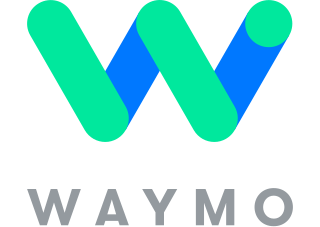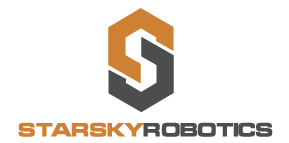
A self-driving car, also known as a autonomous car (AC), driverless car, robotaxi, robotic car or robo-car, is a car that is capable of operating with reduced or no human input. Self-driving cars are responsible for all driving activities, such as perceiving the environment, monitoring important systems, and controlling the vehicle, which includes navigating from origin to destination.

Vehicular automation is the use of technology to assist or replace the operator of a vehicle such as a car, truck, aircraft, rocket, military vehicle, or boat. Assisted vehicles are semi-autonomous, whereas vehicles that can travel without a human operator are autonomous. The degree of autonomy may be subject to various constraints such as conditions. Autonomy is enabled by advanced driver-assistance systems (ADAS) of varying capacity.

Waymo LLC, formerly known as the Google Self-Driving Car Project, is an American autonomous driving technology company headquartered in Mountain View, California. It is a subsidiary of Alphabet Inc.

Ambarella, Inc. is an American fabless semiconductor design company, focusing on low-power, high-definition (HD) and Ultra HD video compression, image processing, and computer vision processors. Ambarella's products are used in a wide variety of human and computer vision applications, including video security, advanced driver assistance systems (ADAS), electronic mirror, drive recorder, driver and in-cabin monitoring, autonomous driving, and robotics applications. Ambarella's system on chips (SoCs) are designed to deliver a combination of video compression, image processing, and computer vision performance with low-power operation to enable cameras to extract data from high-resolution video streams.

Experiments have been conducted on self-driving cars since 1939; promising trials took place in the 1950s and work has proceeded since then. The first self-sufficient and truly autonomous cars appeared in the 1980s, with Carnegie Mellon University's Navlab and ALV projects in 1984 and Mercedes-Benz and Bundeswehr University Munich's Eureka Prometheus Project in 1987. In 1988, William L Kelley patented the first modern collision Predicting and Avoidance devices for Moving Vehicles. Then, numerous major companies and research organizations have developed working autonomous vehicles including Mercedes-Benz, General Motors, Continental Automotive Systems, Autoliv Inc., Bosch, Nissan, Toyota, Audi, Volvo, Vislab from University of Parma, Oxford University and Google. In July 2013, Vislab demonstrated BRAiVE, a vehicle that moved autonomously on a mixed traffic route open to public traffic.
A robotaxi, also known as robot taxi, robo-taxi, self-driving taxi or driverless taxi, is an autonomous car operated for a ridesharing company.
Ottomotto LLC, d/b/a Otto, was an American self-driving technology company founded in January 2016 by Lior Ron and Anthony Levandowski.

Anthony Levandowski is a French-American self-driving car engineer. In 2009, Levandowski co-founded Google's self-driving car program, known as Waymo, and was a technical lead until 2016. In 2016, he co-founded and sold Otto, an autonomous trucking company, to Uber Technologies. In 2018, he co-founded the autonomous trucking company Pronto; the first self-driving technology company to complete a cross-country drive in an autonomous vehicle in October 2018. At the 2019 AV Summit hosted by The Information, Levandowski remarked that a fundamental breakthrough in artificial intelligence is needed to move autonomous vehicle technology forward.

Argo AI LLC was an autonomous driving technology company headquartered in Pittsburgh, Pennsylvania. The company was co-founded in 2016 by Bryan Salesky and Peter Rander, veterans of the Google and Uber automated driving programs. Argo AI was an independent company that built software, hardware, maps, and cloud-support infrastructure to power self-driving vehicles. Argo was mostly backed by Ford Motor Co. (2017) and the Volkswagen Group (2020). At its peak, the company was valued at $7 billion.
Torc Robotics (Torc), an independent subsidiary of Daimler Truck, is an American autonomous truck company headquartered in Blacksburg, Virginia, with operations in Albuquerque, New Mexico; Austin, Texas; and Stuttgart, Germany. Torc is testing autonomous trucks in Virginia, New Mexico, and Texas and is taking a pure play approach to commercialization – focusing at first on one platform in one region.

Starsky Robotics was an autonomous truck company founded in 2016. It developed trucks to drive without a person in the vehicle. The company started in 2015 and had raised $21.7 million by 2018. It failed to find further investors in November 2019, and shut down by March 2020.
aiMotive is an autonomous vehicle technology company. The company aims to work with automotive manufacturers and Tier1s to enable automated technologies. aiMotive describes its approach as "vision-first", a system that primarily relies on cameras and artificial intelligence to detect its surroundings. The technology is designed to be implemented by automobile manufacturers to create autonomous vehicles, which can operate in all conditions and locations. In September 2017, PSA Group teamed up with AImotive.

A self-driving truck, also known as an autonomous truck or robo-truck, is an application of self-driving technology aiming to create trucks that can operate without human input. Alongside light, medium, and heavy-duty trucks, many companies are developing self-driving technology in semi trucks to automate highway driving in the delivery process.

Pony.ai is a global autonomous vehicle technology company co-located in Silicon Valley, Beijing, and Guangzhou.

Applied Intuition is an American software company specializing in products for creating autonomous vehicles (AVs) and advanced driver-assistance systems (ADAS). Founded in 2017 and based in Mountain View, California, Applied Intuition develops tools for the development, testing, and deployment of AV and ADAS technologies in various industries, including automotive, trucking, defense, agriculture, construction, and mining. The company leverages artificial intelligence (AI) technology to provide automakers and other entities with solutions to simulate driving scenarios in the development of autonomous systems.
Aurora Innovation, Inc., doing business as Aurora, is a self-driving vehicle technology company based in Pittsburgh, Pennsylvania. Aurora has developed the Aurora Driver, a computer system that can be integrated into cars for autonomous driving. Aurora was co-founded by Chris Urmson, the former chief technology officer of Google/Alphabet Inc.'s self-driving team, which became known as Waymo, as well as by Sterling Anderson, former head of Tesla Autopilot, and Drew Bagnell, former head of Uber's autonomy and perception team.

TuSimple Holdings, Inc. is a Chinese autonomous trucking company, based in San Diego, California, with offices in Arizona, Texas, and China. It was founded in 2015 by Xiaodi Hou and Mo Chen. In December 2023, the company announced that it would be closing its U.S. business and moving to China.

Inceptio Technology is a Chinese developer of autonomous driving technologies for heavy-duty trucks. The company partnered with two Chinese OEMs to mass-produce Level 3 autonomous trucks starting in late 2021, and its trucks are operated across a nationwide line-haul logistics network in China by customers including Budweiser, Nestle, JD Logistics, and Deppon Express. In 2022, Inceptio Technology received a permit for testing Level 4 driverless autonomous heavy-duty trucks on public roads. The company is based in Shanghai, China and operates a Silicon Valley R&D center in Fremont, California.
Gatik is an autonomous trucking and delivery company that operates in the United States and Canada. The company creates Level 4 autonomous trucking technology for vehicles making middle mile commercial deliveries.













